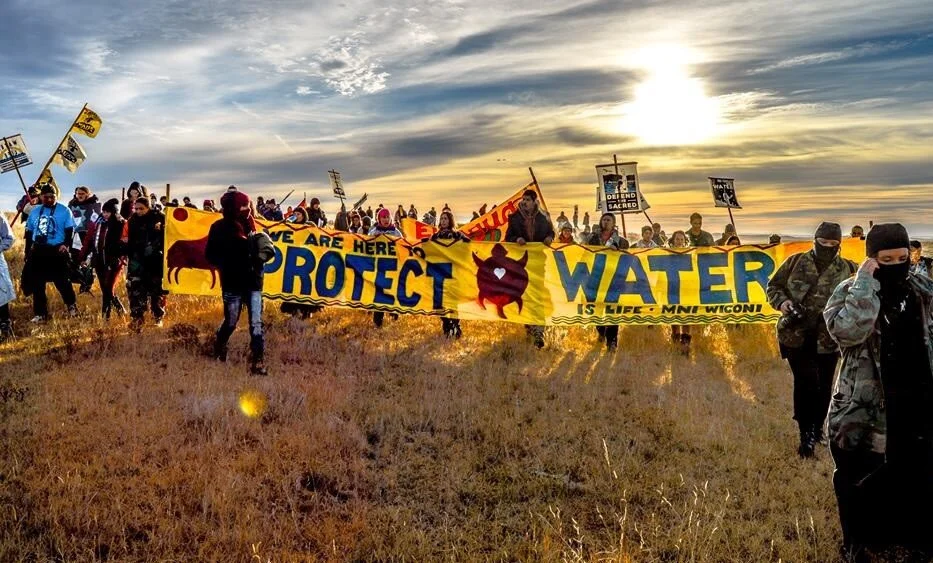Colonization was the first environmental injustice
start there.
As our eco-act for this week, we invite you to learn more about Indigenous histories and movements for environmental justice. Also, please join us in the KTC author talk this Tuesday.
Water Protectors at Standing Rock pictured above. Adrienne reflects below on what the Kitchen Table Conversations have covered in the Environmental Justice (EJ) conversation this spring/summer.
Starting earlier this year at 415 and moving in March over to Zoom, we have been privileged to create a safe space to engage in really, really difficult conversations around Indigenous-settler relations, and specifically environmental (in)justice. Our group is open to all and offered through kakáo, which has allowed us to have a diverse cross-section of folks at the table. The group is facilitated by Lydia Heberling, consistent 2nd Sunday facilitator, former kakáo barista, and PhD at UW studying Native American Literature. Lydia has thoughtfully connected us with media and art, dynamic speakers, and a variety of sub-topics within Indigenous movements.
Some common Indigenous EJ themes and questions that we have explored include:
“Environment” definition: Beyond just the naturalistic, pristine wilderness that we often think of, our environment includes the schools, businesses, housing, health care systems, green spaces, and people around us. Such social realities invite us to think about the history of how our environment came to be, and how such factors continue to shape community.
Progress & environmentalism: The program of progress and environmentalism does not often acknowledge or support the complexities and varied histories of Native communities. An example: animal activists are divided over Makah whaling, which is covered in their treaty rights. Here are a few articles: KUOW & Seattle Times Opinion piece. Rather than understanding complexities, environmentalism tends to fetishize and extract Indigenous culture for its supposed mystical wisdom and relationship to the environment.
Colonialism as the original environmental injustice: As the above suggests, environmentalists do not always center Indigenous EJ as a starting place. The legacy of settler colonialism includes one of forced removal, slavery, ecocide, and continual separation from ancestral land and thus cultural practices that tribes rely on. “If we assume an estimate of eighteen million Indigenous people on the continent…in 1492 and compare that to the Native American population count of roughly 228,000 in the 1890 census…we see a population decline of approximately 99 percent.” (Gilio-Whitaker, 49). Our praxis of environmental justice must address the devastating legacy of Colonialism and how BIPOC (Black, Indigenous, & People of Color) are affected disproportionately compared to white people.
History, Christianity, Capitalism, & Western society: Unfortunately, Western ideals around Manifest Destiny and the belief that Native life (bodies, culture, ways of being) was inferior to Christian doctrine and social norms were popular among European settlers since first contact was made. Such racial and religious presumptions justified ill-treatment and removal of Natives, and continue to perpetuate the idea that corporations and the US gov’t/legal system know better than Indigenous communities. For many of us as Christians embedded in our capitalist society, we have wondered what a way forward could look like that accounts for our religion’s history and our current complicity in our nation’s Settler State policies that continue erasing Indigenous people.
Indigenous EJ histories: Different tribes have different histories. There have actually been many attempts to address Native EJ at the US Federal level (ie: the EPA), however, tribal consultation and recommendations have not historically panned out, especially with the tangle of corporate / gov’t interest, and inconsistencies in Federal and State recognition of tribal sovereignties. Many Native protests and occupations have led to increments of change, though their struggle has been continual for the last 500 years. Environmental injustice and our current climate crisis is not recent history for Indigenous communities.
Other topics discussed include the health of Indigenous land, ecosystems, and people; the National Park formation and the harmful roots of the conservation/preservation movements; Native food (and land) sovereignty; Indigenous women in the EJ movement; what a new framework for coalition building could look like; and Christian confession and responsibility.
Overall, the space created by the virtual Kitchen Table Conversations has been especially formative and fruitful. As we continue to faithfully resist ongoing racial injustice (really any injustice) in our country, we have been reminded how necessary it is to do this critical work in community. KTC will be taking a summer break for July, stay tuned for updates!
Many of these topics have been guided by our reading of *Dina Gilio-Whitaker’s book As Long as the Grass Grows: The Indigenous Fight for Environmental Justice, from Colonization to Standing Rock. We have the incredible opportunity to talk with her this Tuesday and we hope you’ll join us!




